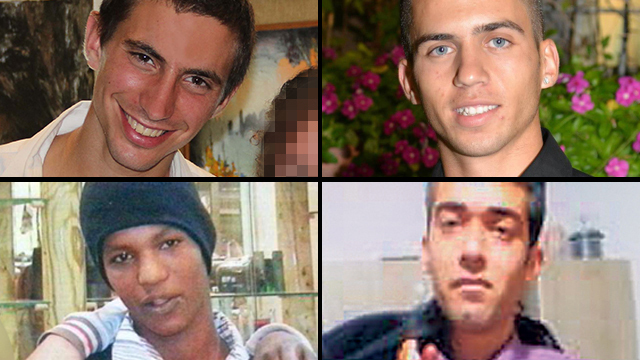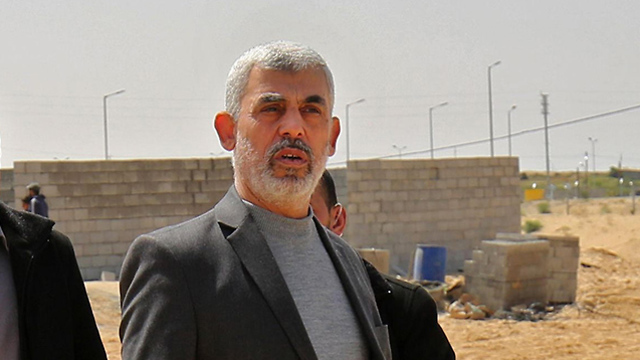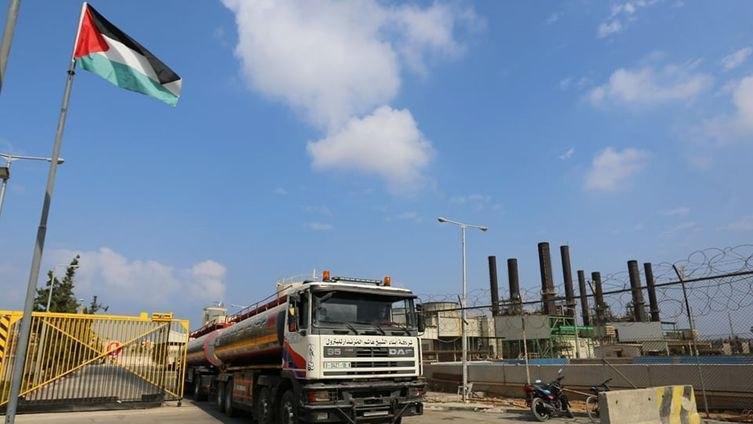Getting your Trinity Audio player ready...
The outgoing chairman of the Knesset Foreign Affairs and Defense Committee, Zvi Hauser, recently asked Prime Minister Benjamin Netanyahu to block a reported agreement with Hamas that would see Palestinian prisoners freed by Israel in return for the bodies of two fallen IDF soldiers and two civilians believed held in Gaza.
Hauser likely saw a draft of a deal that included the release of Hamas prisoners with no Israeli blood on their hands, though it is unclear whether such a proposal was even relayed to the terror organization.
3 View gallery


Clockwise from top left: Fallen soldiers Hadar Goldin and Oron Shaul, captives Hisham al-Saeed and Avera Mengistu
The lawmaker's public proclamation did however prompt Hamas officials to announce on local radio stations that Israel was not sincere about reaching such a deal.
There is some doubt as to whether Yahya Sinwar - the Hamas leader in Gaza who was himself freed in a 2011 prisoner swap - would be willing to advance any arrangement with Israel that did not include the release of Hamas prisoners, including those with blood on their hands.
It is possible that Israel has made some compromises since the latest round of talks with Hamas began in late October, but they would not include a change in the list of Hamas prisoners slated for release.
3 View gallery


Hamas leader Yahya Sinwar tours site selected for coronavirus treatment center in Gaza in April
(Photo: AFP)
Hamas insists that any deal includes a precondition to free Palestinians prisoners re-arrested by Israel following their release in the 2011 prisoner swap, which saw the return of IDF soldier Gilad Shalit after five years in Gaza captivity.
They also insist sick prisoners, women and minors being held by Israel are also allowed to go home.
These demands alone would not have prevented an agreement being reached with Israel, but some of the prisoners named by Hamas will not be acceptable to the Israeli government.
Sinwar is campaigning for re-election in an internal Hamas election scheduled for January. His opponents include Khaled Mashaal, the former Hamas chairman, and Saleh al-Arouri, who founded the organization's military wing.
This is no time for him to be making concessions to Israel, especially on the issue of Palestinian prisoners, which he himself was for many years. He has built his reputation on his commitment to bringing about the release of many of his fellow prisoners. If he were to be seen neglecting that commitment, he would be surely voted out of office.
Israel seems to have been trying to soften Sinwar's resistance in recent weeks, with the Defense Ministry quietly permitting some restrictions on the Strip to be lifted.
On one occasion, Gazan strawberries were allowed to leave for international markets and on another potatoes were allowed to be exported. More money from Qatar was also permitted to flow into Gaza last week.
Israeli officials are concerned Hamas may lose control of the coronavirus pandemic in Gaza. Sinwar has already said that in such an eventuality, Israel would be made to pay unless medical equipment and supplies were provided.
But despite Jerusalem's hope that the pandemic could be an opportunity to pressure Hamas to make a deal, the terror group's demands indicate otherwise.
An Egyptian official moderating the talks arrived in Gaza for an hours-long visit last week. His arrival prompted rumors and speculation that a prisoner swap was imminent, but the talks actually were more more focused on internal Palestinian issues than on a potential swap.
Israeli defense officials call it a "tragic" situation. Hamas needs an economic breakthrough and for major infrastructure projects to get underway.
Israel has been willing to see negotiations for a long-term understanding play out but no progress has been made after six years as there is no agreement between the side on which Hamas prisoners would be released.
Both sides will have to bend a little bit more, but at this stage neither seems willing to consider it.


